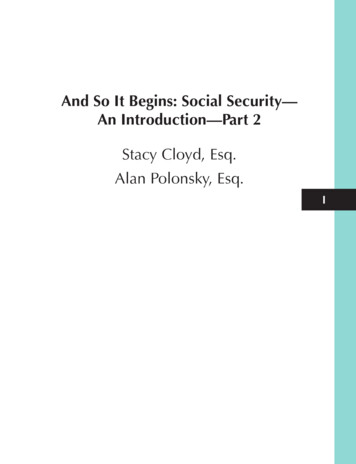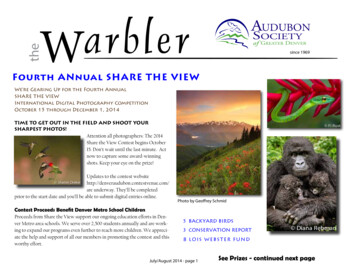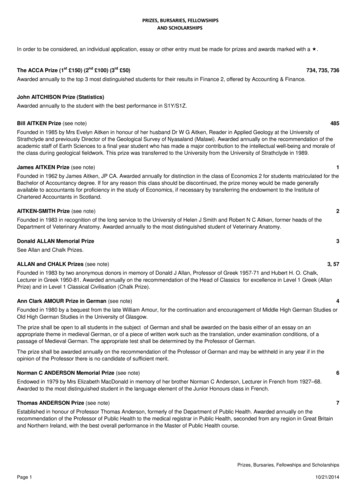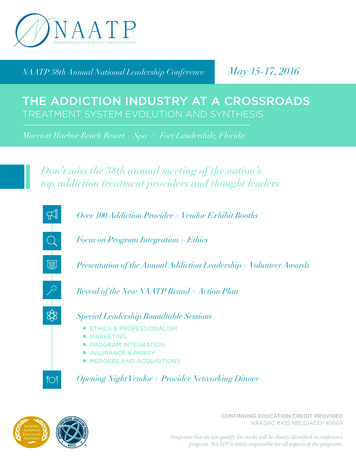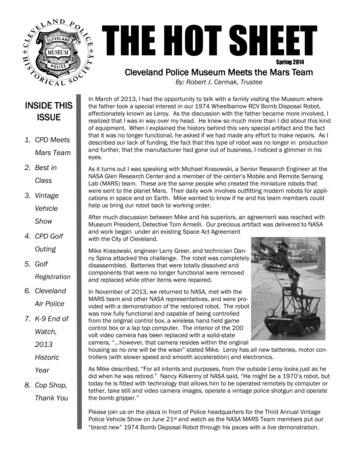
Transcription
http://www.facebook.com/JanisDesignProject editor: Shoshana GlatzerJune 2016The Authority for Research and DevelopmentThe Hebrew University of JerusalemProject coordinator: Ayelet SagivThe Hebrew University of JerusalemThe Authority for Research and Developmenthttps://research.huji.ac.ilTel: 972-2-658-6625/6/8; Fax: 972-2-561-8196ThePolonskyPrizesfor Creativity & Originalityin the Humanistic Disciplinesat the Hebrew University of Jerusalem תשע"ו 2016
PolonskyPrizesfor Creativity and Originalityin the Humanistic Disciplines - 2016Dr. Leonard S. Polonsky CBEDr. Leonard S. Polonsky CBE has had a successful business career in thefinancial services sector and is a philanthropist with particular interestsin higher education, cultural heritage and the arts.Dr. Polonsky grew up in New York City. He was a pupil at the prestigiousTownsend Harris High School, and received his BA degree from New YorkUniversity at age 18. Following military service in 1945–46, he pursuedgraduate studies in literature at Lincoln College, Oxford, and at theSorbonne, Paris, where he received his doctorate in 1952. He taught inHeidelberg for several years before embarking on his business career.Dr. Polonsky began working in financial services in New York in 1955,gaining further experience in Rome, Frankfurt, and Zurich, beforeestablishing Liberty Life Assurance Company Ltd in London in 1970.Hansard Global plc, its successor, of which he is President, has beenlisted on the London Stock Exchange since 2006.Dr. Polonsky has involved himself in a broad range of philanthropicactivities over many years. In 2013 he was named a Commander of theBritish Empire (CBE) for charitable services by HM Queen Elizabeth II. Heis a Companion of the Guild of Benefactors of Cambridge University, aFleming Fellow at Lincoln College, Oxford, and an Honorary Member ofthe Royal College of Music, London.Dr. Polonsky holds an Honorary Doctorate from the Hebrew Universityof Jerusalem, of which he is a Governor and where he serves on theBoard of the Harry S. Truman Research Institute for the Advancement ofPeace. At the Hebrew University he established the Polonsky Prizes forCreativity and Originality in the Humanities, which have been awardedannually since 2004. Other support for the Hebrew University includesawards for study in China and scholarships for undergraduates ofEthiopian background.He is founding chairman of the board of trustees of The PolonskyFoundation, which supports charitable projects in the UK, the USA,Israel, and Europe. Principal activities of the Polonsky Foundationinclude: the digitization of significant collections at leading libraries(the Bodleian Library, Oxford; Cambridge University Library; the BritishLibrary; the New York Public Library; the Library of Congress; the VaticanApostolic Library); support for Theatre for a New Audience at thePolonsky Shakespeare Center in Brooklyn, New York; and the PolonskyAcademy for Advanced Study in the Humanities and Social Sciences atthe Van Leer Jerusalem Institute, and the post-doctoral fellowships itoffers.In Israel The Polonsky Foundation also supports the University of Haifaand the Bezalel Academy of Arts and Design, of which Dr. Polonsky is aGovernor and Honorary Fellow.23
PolonskyPrizesfor Creativity and Originalityin the Humanistic Disciplines - 2016Category AResearchersFirst PrizeA Messagefrom the DeanProf. Manuela ConsonniDepartment of the History of the Jewish People and Contemporary Jewry, and School of HistoryFaculty of HumanitiesL’eclisse dell’Antifascismo. Resistenza, questione ebraica e cultura politicain Italia, 1943-1989Dear Friends and Colleagues,Scholarly activity in the Humanities is expressed in different forms:monographs, the editing of original sources, journal articles and more, allof which are based on extensive research, intellectual analysis and writing.Every year, members of the Faculty of Humanities at the Hebrew Universitypublish their scholarship in prestigious journals and academic publishinghouses in Israel and abroad. It is such scholarly endeavors that havemade the Faculty of Humanities in Jerusalem one of the leading centersof humanistic study in the world, and have contributed to the overallreputation of the Hebrew University as a foremost academic institution.Prof. Dror WahrmanThe Polonsky Prizes were established over a decade ago through thegenerosity and vision of Dr. Leonard Polonsky and the Polonsky Foundation.These prizes give clear recognition to both senior and junior membersof the Faculty of Humanities and elsewhere at the University who havedemonstrated the highest standards of scholarship in the humanisticdisciplines. All the recipients of this year's prize – from a Fleming Fellowat Lincoln College, Oxford, and an Honorary Member of the Royal Collegeof Music, London -- were chosen by a committee consisting of membersof the Faculty of Humanities, along with the Vice President for Researchand Development, Prof. Isaiah (Shy) Arkin and myself. This year’s prizewinners were chosen from a particularly strong list of contenders in thedifferent categories, making the selection especially challenging. All in all,the high quality of all the submissions left me with a feeling of pride in thedistinctive and excellent work being produced in the fields of Humanitiesat the Hebrew University of Jerusalem. It gives me great pleasure to thankthe members of the prize committee for their hard work, as well as Prof.Arkin for his support, Ms. Rachel Nathan from the Faculty of Humanitieswho coordinated the work of the prize committee, and Ms. Ayelet Sagiv ofthe Authority for Research and Development at the Hebrew University, forcrucial administrative matters, not the least coordinating this ceremonytoday.We are grateful to the Polonsky Foundation for their support andencouragement. We look forward to next year’s competition, and theinteresting and original studies that it will bring to our attention.With best wishes,Prof. Dror WahrmanDean, The Faculty of Humanities4Prof. Rina TalgamDepartment of Art HistoryFaculty of HumanitiesMosaics of Faith: Floors of Pagans,Jews, Samaritans, Christians,and Muslims in the Holy LandSecond PrizeCategory BYoungResearchersDr. Yakir PazDepartment of Talmud and HalachaFaculty of HumanitiesFrom Scribes to Scholars: Rabbinic Biblical Exegesis in Lightof the Homeric CommentariesDr. Meron PiotrkowskiDepartment of the History of the Jewish People and Contemporary JewryFaculty of HumanitiesPriests in Exile: The History of the Temple of Oniasand Its Community in the Hellenistic PeriodCategory CMA/DoctoralStudentMr. Ray SchrireDepartment of HistoryFaculty of HumanitiesLearning Latin in 16th and 17th Century England: Lily's Grammaras a Case Study in Cognitive History5
First PrizeProf. Rina TalgamDepartment of the History of Art, Faculty of HumanitiesProf. Talgam, the Alice and Edward J. Winant Family Professor of Art History, received her Ph.D. from TheHebrew University in 1996 and joined the faculty the following year. Her research interests include the art ofthe Middle East from the Hellenistic period to the Umayyad period, specialization in mosaic pavements, andthe mutual influences between "paganism", Judaism, Samaritanism, Christianity and Islam, the emergenceand sources of Umayyad art, and ancient synagogues. Her books include, with Zeev Weiss, The Mosaics ofthe House of Dionysos at Sepphoris (Jerusalem, 2004), and The Stylistic Origins of Umayyad Sculpture andArchitectural Decoration (Wiesbaden, 2004). In 2013, she received the Milkin Prize for years of excellence inteaching.Mosaics of Faith:Floors of Pagan,Christians, andMuslims in theHoly LandMosaics of Faith offers a comprehensive analyticalhistory of the Hellenistic, Roman, Byzantine,Umayyad and Early Abbāsid mosaics in the HolyLand (present day Israel, Jordan and the PalestinianAuthority). During these periods the Holy Landbecame a central arena where different faiths met,communicated, competed and conflicted with eachother. Mosaics are not mere decorations, for whenapproached critically they can be read as first-ratehistorical documents that sharpen and refineour understanding of societies, their ideologies,institutions, and liturgies. The inclusion of mosaicsin the scholarly discourse makes possible a richerperception of the past and sheds light on both theintimate links and the disjunctions between art andtext. The book demonstrates how mosaics playedan important role in constructing cultural, religious,and ethnic identities in a multicultural societyand follows the intricate visual dialogues amongpaganism, Judaism, Samaritanism, Christianity, andIslam.6The mosaics located in private and public spheres,in both secular and religious buildings, were oftenintended to reflect the difference among thevarious communities, but they also testify to theexistence of an extensive commonality. The bookexamines the relations between the religious andsecular spheres and indicates a considerable degreeof dynamism in the drawing of the boundariesbetween them over the course of time. What makesthis endeavor both timely and imperative are recentarchaeological discoveries that have considerablyenriched the existing corpora and, above all, havechallenged prevailing assumptions.The wide chronological range (a millennium) that isexamined in this book enables one also to trace theprocesses of continuity and change in the transitionbetween the periods along the diachronic axis. Thediscussion of the mosaics touches upon a long list ofquestions and deals with all aspects of the mosaics.Alongside the study of iconographic aspects, itexamined the compositional characteristics, thestyle, and the technique of the mosaic.Researcher7
Second PrizeProf. Manuela ConsonniDepartment of Romance and Latin American Studies - Italian StudiesDepartment of the History of the Jewish People and Contemporary JewrySchool of HistoryFaculty of HumanitiesProf. Manuela Consonni earned her Ph.D. summa cumlaude in 2004 at the Hebrew University, where shejoined the faculty in 2007. She is the current chairof the Department of Romance and Latin AmericanStudies, Director of the Italian Studies Program, andsince 2015, Director of the Vidal Sassoon Center for theStudy of Antisemitism. She was a DAAD and Max PlanckPostdoctoral Fellow, Berlin, a postdoctoral fellow atCornell University, and at Scholion. She was a visitingscholar at the Simon Dubnow Institute for Jewish Historyand Culture, Leipzig, and at UCLA. Her previous book,Resistenza o Shoah, the Memory of the Deportation andExtermination in Italy between 1945-1985 was publishedby Hebrew University Magnes Press (2010).L’eclisse dell’Antifascismo. Resistenza, questione ebraica e cultura politica inItalia, 1943-1989 (Bari: Laterza 2015)The Eclipse of Anti-Fascism presents the history ofthe "Anti-Fascist paradigm," as the backbone of theItalian Republic, from its inception to its decline,from 1943 up to 1989. The book develops as ahistorical biopsy that spans political and historicaldebates, the press, journals, and countless reports.It offers, for the first time in the historiographicdebate on modern Italy, a combined interpretationof three different orders of discourse: the Warof Liberation, the Jewish question, and Italianpolitics, all analyzed together and intertwinedwith one another as both history and as memory.The result is an original interpretation of the wayin which Italy has built, since the liberation, theinterpretative paradigm of its history (the “antiFascist paradigm”). The book thus challenges the‘Ideology of the Republic’, an ideology that, in spite8of the Italian Republic's forces victory over Fascism,preferred not to engage in a serious investigationof the past. They chose, instead, to deny and eraseItalian responsibility for Fascism and the regimeof Salò, throwing the blame solely on the Nazi‘occupation’ and not on the violent ideologicalconfrontation between Italian Fascists and Italiananti-Fascists in the context of a civil war. The bookshows how, beside political anti-Fascism, a parallelcounterculture arose, a form of cultural resistancein civil society, committed to keeping alive thememory of the anti-Fascist struggle in general, andthe political deportations and extermination of theJews, in particular, pointing to parallels betweenthe failure of Italian politics since the war, and thechanging role ascribed to the Resistance and to theJewish question in the dominant ideology. Consonnisees Primo Levi as the greatest interpreter of thisreconstruction of Italian anti-Fascism; his workfunctions as a model for different approaches foranalyzing anti-Fascism, Fascism, and Communism,through the lens of his experiences as a survivor,a writer, and an engaged intellectual. Finally, thebook succeeds in proving that partially this processwas due to the Catholic Church’s role as an activeplayer in the Italian political discourse. Consonnifinallycontends that the result of this refusal toengage with the past creates a ‘melancholic’ historyof modern Italy, in which the past does not passaway or, alternatively, passes too fast.Researcher9
Dr. Yakir PazDepartment of Talmud and HalachaFaculty of HumanitiesYakir Paz received his Ph.D. from the HebrewUniversity, under the supervision of Prof. ShlomoNaeh and Prof. Maren Niehoff. As a recipient of theRothschild Postdoctoral Fellowship (2014/2015) hewas a guest scholar at Yale and Ca’ Foscari, Venice.He is currently a Buber Fellow at the HebrewUniversity. His main specializations are Rabbinicand Syriac literature, commentaries in Antiquity,and religious interactions in the Roman andSassanian Empire.In Alexandria during the first centuries BCE, manyscholars, of whom the most prominent were thechief librarians Zenodotus, Aristophanes andAristarchus, began compiling critical editions of theHomeric poems with commentary, while developingelaborate philological, rhetorical, grammatical, andliterary methods and terminology. This exegeticaltradition, inspired by the non-allegorical literaryapproach of Aristotle, continued to evolve duringthe Roman period outside of Alexandria, and waslater assembled into large collections, which haveFrom Scribes to Scholars: Rabbinic BiblicalExegesis in Light of the Homeric Commentariescome down to us mainly in the margins of Byzantinemanuscripts and in several papyri. This huge body ofcommentary, written in a highly technical languageand as yet to be translated, is of utmost importancefor our understanding of the development of biblicalexegesis in Late Antiquity. However, except for ahandful of studies which have focused only on selectcommentaries, Homeric scholarship has to datereceived very little attention from scholars of rabbinicexegesis.In this study, Dr. Paz provides for the first time acomprehensive evaluation of the profound anddiverse impact of the Homeric scholarship on theformation of rabbinic biblical commentaries and theirmodes of exegesis, especially as they are expressed inthe Halakhic midrashim (3rd century CE). Based on thecomparisons between the two corpora, he contendsthat the appearance of Midrash as a distinct genrewhich contains diverse opinions, and uses explicitlycomplex exegetical methods and fixed terminologynot previously documented in Jewish commentaries,can be fully understood only against the backdrop ofGreek exegesis. Moreover, the impact of the Homericscholarship on rabbinic biblical exegesis was notmerely technical but also had a profound effect on theway the rabbis perceived, and hence interpreted, thebiblical text itself. The rabbis read and commentedon the Torah according to the aesthetical, rhetorical,grammatical and literary standards of the period andshared with their Hellenistic contemporaries a similarunderstanding of the role of the commentator. In lightof these conclusions, we may now reevaluate many ofthe scholarly assumptions regarding the origins of therabbinic exegetical project, by situating the rabbis intheir larger historical context.10YoungResearcher11
Dr. Meron PiotrkowskiDepartment of the History of the Jewish People and Contemporary JewryFaculty of HumanitiesDr. Meron M. Piotrkowski, born in Berlin in 1977, holds a B.A. in Jewish Studies,Political Sciences and Business Administration from the Free Universityof Berlin and an M.A. in Jewish Civilization from the Hebrew University ofJerusalem. He continued his studies in the field of ancient Jewish history at theHebrew University and completed his Ph.D. in 2015 under the supervision ofProf. Daniel R. Schwartz. He is currently a postdoctoral researcher at the HebrewUniversity, working on the Corpus Papyrorum Judaicarum IV and a lecturer atBerlin's Free University’ Institute of Jewish Studies.Priests in Exile: The Historyof the Temple of Oniasand Its Communityin the Hellenistic Period12Piotrkowski's dissertation, “Priests in Exile: TheHistory of the Temple of Onias and Its Communityin the Hellenistic Period,” seeks to provide acohesive history of the so-called Temple of Oniasin the Hellenistic period. Founded by the oustedJerusalemite high priest Onias III in the 160s BCEsomewhere in the Egyptian Heliopolite nome,the Temple of Onias was a phenomenon ofancient Diaspora Judaism and existed for over twocenturies, outlasting even the great Temple ofJerusalem. However, due to a frustrating scarcityof evidence about it, it remains a nebulous chapterin the history of the ancient Jewish EgyptianDiaspora and in the study of ancient Judaism onthe whole. This sparsity of sources leaves FlaviusJosephus as our main source for the history ofOnias' Temple. In his dissertation, the Piotrkowskihas not only addressed the most pressing - and stillopen - historical questions concerning the Templeof Onias, such as, the identity of the temple'sfounder (Onias III or Onias IV), but also - for thefirst time - addressed issues pertaining to theOniad community and its place in the EgyptianJewish Diaspora. Although the thesis focuses on avery specific subject, it casts a wide net and dealswith a variety of key fields of research on ancientJudaism: Josephus, archaeology, Jewish-Hellenisticliterature, Qumran, rabbinic literature, papyrologyand inscriptions. Piotrkowski also investigatedthe role and function of the Oniad Temple inthe larger contexts of Ptolemaic, Seleucid (i.e.,“international”) politics and culture. Here, he arguesthat the Temple of Onias as a temple of foreignmercenaries was by no means all that exceptionalin its Ptolemaic Egyptian context. Its existence is tobe set against the backdrop of an overall Ptolemaicdefense strategy. Moreover, since its foundationoccurred during Antiochus Epiphanes' persecutionof Judaism in Judaea, the author argues that it wasnot a rival sanctuary as is generally assumed, butthe only functioning sanctuary in the Jewish world.YoungResearcher13
Mr. Ray SchrireDepartment of HistoryFaculty of HumanitiesRay Schrire earned both his B.A. (Philosophy andthe Honors Program in History) and M.A. (History)at the Hebrew University of Jerusalem. He is aPh.D. candidate in history at the Jack Joseph andMorton Mandel School for Advanced Studies in theHumanities and is currently a Visiting Researcherat the University of California, Berkeley. His workfocuses on the interactions between the history ofscience, history of the book and cognitive studies.Learning Latinin 16th and 17thCentury England:Lily's Grammar asa Case Study inCognitive History142015The Polonsky Prizesfor Creativity and Originalityin the Humanistic Disciplines2013First Prize:Although the role education plays in shaping one'smind is extensively researched by contemporarycognitive scientists, historians often overlook thecognitive aspects of early modern learning. This thesis,however, through its focus on the interactions of printand manuscript, shows that the study of Latin shiftedfrom being focused on memory to becoming an activitydesigned for comprehension. It can thus be read asa case study of larger questions relating to the wayscognition interplays with historical reality.20142012Polonsky Prizes 2015This M.A. thesis examines the cognitive aspects ofthe study of Latin in 16th and 17th century England.By bringing together cultural history with cognitivesciences it aims to elucidate how Early Modern studentsthought, as they faced the challenge of learning asecond language – a challenge that stood at the verycore of grammar school education. To answer thisquestion, it analyzes three different types of historicalsources: On the level of ideas, influential pedagogicaltreatises are examined in order to uncover the explicitand implicit cognitive expectations of Humanist andPuritan pedagogues in the period beginning withErasmus's De Ratione Studii (1511) and ending withJohn Locke's Some Thoughts Concerning Education(1693). On the level of learning tools, England's mostcommon textbook, Lily's Grammar, is investigatedso as to reconstruct the cognitive implications of itsmethods, structure, style of writing and graphic designas these evolved and were changed by scholars andprinters throughout the textbook's many editions.Finally, on the level of study practices, the manuscriptannotations found on more than one hundred copies ofthe textbook are inspected in order to understand theactual cognitive habits of early modern students. Thepoints of convergence and divergence between thesethree levels of analysis help sketch a vivid, multilayeredpicture of the Renaissance classroom's cognitiveecology in a period in which, due to the power of printto reproduce affordable, personal textbooks, schoolingwent through radical transitions.MA/DoctoralStudentPrevious Polonsky PrizeWinnersFor his book:Second Prize:For her book:Young Researcher:Dr. YOSSI MAUREYDepartment of Musicology, Faculty of HumanitiesMedieval Music, Legend, and the Cult of St. Martin:The Local Foundations of a Universal SaintProf. YFAAT WEISSDepartment of the History of the Jewish People and Contemporary Jewry,and the School of History, Faculty of HumanitiesJourney and Imaginary Journey: Leah Goldberg in Germany, 1930-19332010Dr. JOSEPH WITZTUMDepartment of Arabic Language and Literature, Faculty of HumanitiesThe Syriac Milieu of the Quran: The Recasting of Biblical NarrativesYoung Researcher:2011Mr. ELI OSHEROFFDepartment of Islamic and Middle Eastern Studies, Faculty of HumanitiesWhere Did You Come From? The History of the Jewish Peoplein Early Palestinian Historiography (1920-1948)Polonsky Prizes 2014200920082007Prof. DROR WAHRMANDepartment of History, Faculty of HumanitiesFor his book: Mr. Collier’s Letter Racks: A Tale of Art and Illusion at the Threshold of the Modern Information AgeFirst Prize:Second Prize:Dr. UZI LEIBNERInstitute of Archaeology, Faculty of HumanitiesFor his article:The Origins of Jewish Settlement in the Galilee in the Second Temple Period:Historical Sources and Archaeological DataDr. TAWFIQ DA’ADLIThe Martin Buber Society of Fellows, Faculty of HumanitiesThe Pictorial Language of the Herat School of Painting: Two NizāmīManuscripts as a Case StudyYoung Researcher:Young Researcher:Ms. NOA NAHMIASDepartment of Asian Studies, Faculty of HumanitiesDisplaying Patriotism: Narratives of the May 4th Movement in Chinese Museums15 15200620052004
The Polonsky Prizesfor Creativity and Originalityin the Humanistic DisciplinesPolonsky Prizes 2011First Prize:For her book:Second Prize:For her book:Polonsky Prizes 2013First Prize:For her book:Second Prize:For his book:Young Researcher:Dr. Ofra Tirosh-BeckerDepartment of Hebrew and Jewish Languages, Faculty of HumanitiesRabbinic Excerpts in Medieval Karaite LiteratureDr. Shimon Gesundheit (Bar-On)Department of Bible, Faculty of HumanitiesThree Times a Year: Studies on Festival Legislation in the PentateuchDr. Yitzhak FreedmanDepartment of Comparative Religion, Faculty of HumanitiesDeath, Performance and Text in the Early Upanisads2015Prof. Maren R. NiehoffDepartment of Jewish ThoughtJewish Exegesis and Homeric Scholarship in Alexandria (Cambridge, 2011)Prof. Esther CohenDepartment of HistoryThe Modulated Scream: Pain in Late Medieval Culture. 1755-1816 (Chicago, 2010)Young Researcher:Dr. Maoz KahanaDepartment of the History of the Jewish PeopleFrom Prague to Pressburg: Halakhic Writing in a Changing World, from the “Noda B’Yehudah”to the “Hatam Sofer,” 1730-1839MA/Doctoral Student:Ms. Michal Altbauer RudnikDepartment of HistoryThe Wounds of Love Are Cured Only by Those Who Made Them: Prescribing Marriagefor Lovesickness in Early Modern European Medical WritingFor her article:Polonsky Prizes 2010Prof. Yuri PinesDepartment of East Asian Studies, Faculty of HumanitiesFor his book: Envisioning Eternal EmpireFirst Prize:For his book:Dr. Pawel MaciejkoDepartment of Jewish Thought, Faculty of HumanitiesThe Mixed Multitude: Jacob Frank and the Frankist Movement 1755-1816Young Researcher:Ms. Liat NaehInstitute of Archeology, Faculty of HumanitiesMiniature Vessels and Seven-Cupped Bowls in the Middle Bronze Age Temple of Nahariya:Their Role and Meaning in Light of Cultic Miniature and Complex Vessels of the Middle Bronze AgeFor her thesis:Dr. Simcha Kojman-RozenHistory, Philosophy and Sociology of Science Program, Faculty of HumanitiesTime and Emergence in Scientific Theories in England in the 19th CenturyFor her article:Ms. Noga Ayali-DarshanDepartment of Jewish History, Faculty of HumanitiesThe Bride of the Sea: The Tradition about Astarte and Yamm in the Ancient Near EastPolonsky Prizes 2012Polonsky Prizes 2009Young Researcher:First Prize:Mr. Ariel ZinderDepartment of Hebrew Literature, Faculty of Humanities“Is This Thy Voice?” Rhetoric and Dialogue in Shlomo Ibn-Gabirol’s Poems of Redemption(‘Piyyutei Ge’ulah’)Prof. Ruth HaCohenDepartment of MusicologyThe Music Libel against the JewsSecond Prize:Dr. Yuval Noah HarariDepartment of HistoryA Brief History of MankindYoung Researcher:Dr. Aleksei KrakhmalnikovDepartment of German, Russian and Eastern European StudiesThe Literature of the Belokrynitsa Old-Believers (1846-1862)Dr. Jennifer OserFedermann School of Public Policy and GovernmentExpanded Citizen Participation and Participatory Inequality: A Vicious or Virtuous Circle?Young Researcher:MA/Doctoral Student:Mr. Yaron GirshSchool of Education and Department of Sociology and Anthropology“The Cultural Boundaries of Thinking”: Cultural Narratives in the Philosophy of Educationof Friedrich Nietzsche and John Dewey16Second Prize:First Prize:For his book:2014201320122011201020092008Dr. Yuval Noah HarariDepartment of History, Faculty of HumanitiesThe Ultimate Experience: Battlefield Revelations and the Making of Modern War Culture, 1450-2000Second Prize:Prof. Simcha EmanuelMandel Institute of Jewish Studies, Faculty of HumanitiesFor his book:Fragments of the Tablets - Indian and Armenian Studies, Faculty of HumanitiesFor his dissertation:The Fullness of Emptiness: Nāgārjuna’s Thought in Light of the Yukti-sastika-karikaand the Śūnyatā-saptatiYoung Researcher:Dr. Nira Alperson-AfilInstitute of Archeology, Faculty of HumanitiesFor his dissertation:Ancient Flames: Controlled Use of Fire at the Acheulian Site of Gesher Benot Ya’aqov, IsraelStudent Prize:Ms. Noa ShasharMandel Institute of Jewish Studies, Faculty of HumanitiesFor her MA thesis:The Role of Niddah Laws in Daily Lives of Men and Women in the Ashkenazi Worldof the 17th-19th CenturiesMr. Kobi Ben-MeirForum Europa, Faculty of Social SciencesFor her MA thesis: Images of Pain, Disease and Death in 1970’s Israeli ArtStudent Prize:172007200620052004
Polonsky Prizes 2008First Prize:Dr. Michael SegalMandel Institute of Jewish Studies, Faculty of HumanitiesFor his book:The Book of Jubilees: Rewritten Bible, Redaction, Ideology and Theology (2007)Second Prize:For his book:Second Prize:For his book:Prof. Ronnie EllenblumDepartment of Geography, Faculty of Social Sciences and School of History, Faculty of HumanitiesCrusader Castles and Modern Histories (2007)Dr. Michael RoubachDepartment of Philosophy, Faculty of HumanitiesBeing and Number in Heidegger’s Thought (2008)Student Prize:Mr. Maoz KahanaMandel Institute of Jewish Studies, Faculty of HumanitiesFor his MA thesis:Stability and Change in the Responsa of Rabbi Moshe SoferStudent Prize:Mr. Oded PoratMandel Institute of Jewish Studies, Faculty of HumanitiesFor his MA thesis:Studying the Treatise “Brit Hamnuha” (“Covenant of Serenity”):Its Ideas, Literature Relationships and an Introduction to the Critical EditionPolonsky Prizes 2007Dr. Diego OlsteinDepartment of History, Faculty of HumanitiesFor his book: La Era Mozárabes: Los Mozárabes de Toledo (Siglos XII y XIII) en la Historiografía:Las Fuentes y la HistoriaFirst Prize:Second Prize:For her book:Second Prize:For his book:Prof. Gannit AnkoriDepartment of Art History, Faculty of HumanitiesPalestinian ArtDr. Jonathan Dekel-ChenHarman Institute of Contemporary Jewry, Faculty of HumanitiesFarming the Red Land: Jewish Agricultural Colonization and Local Soviet Power, 1924-1941Young Researcher Prize:Dr. Tsippi KauffmanMandel Institute of Jewish Studies. Faculty of HumanitiesFor her dissertation: Between Immanence and Religious Behavior: Avodah be-Gashmiyut in the Early Stages of HasidismStudent Prize:For his paper:Mr. Ilya BerkovichDepartment of History, Faculty of HumanitiesSally: A Comparative Survey into the Nature of Medieval WarfarePolonsky Prizes 2006First Prize:Prof. Yosef GarfinkelInstitute of Archeology, Faculty of HumanitiesFor his book:Dancing at the Dawn of AgricultureFirst Prize:For his book:Young Researcher Prize:For her article:Prof. Benny ShanonDepartment of Psychology, Faculty of Social SciencesThe Antipodes of the MindStudent Prize:For her dissertation:Dr. Elisheva Rigbi-ShafrirDepartment of Musicology, Faculty of HumanitiesThe Modern in Music 1980-1920 against the Crisis of Historicism and the Breakdownof Rational Paradigm: A Critical Analysis of a StyleMs. Gabriela SternfeldDepartment of Spanish and Latin American Studies, Faculty of HumanitiesFor her dissertation: La Organiza
PolonSky PRizeS for Creativity and originality in the Humanistic Disciplines - 2016 2 3 Dr. leonard S. Polonsky Cbe has had a successful business career in the financial services sector and is a philanthropist with particular interests in higher education, cultural heritage and the arts. Dr. Polonsky grew up in new york City.


